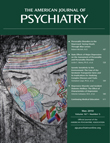State Effects of Major Depression on the Assessment of Personality and Personality Disorder
Abstract
Objective
The authors sought to determine whether personality disorders diagnosed during a depressive episode have long-term outcomes more typical of those of other patients with personality disorders or those of patients with noncomorbid major depression.
Method
The authors used 6-year outcome data collected from the multisite Collaborative Longitudinal Personality Disorders Study (CLPS). Diagnoses and personality measures gathered from the study cohort at the index assessment using interview and self-report methods were associated with symptomatic, functional, and personality measures at 6-year follow-up. Of 668 patients initially recruited to the CLPS, 522 were followed for 6 years. All participants had either a DSM-IV diagnosis of one of four personality disorders (borderline, schizotypal, obsessive-compulsive, or avoidant) or a DSM-IV diagnosis of major depressive disorder with no accompanying personality disorder.
Results
Six-year outcomes for patients with comorbid personality disorder and major depressive disorder at the index evaluation were similar to those of patients with pure personality disorder and significantly worse than those of patients with pure major depressive disorder. Stability estimates of personality traits were similar for personality disorder patients with and without major depressive disorder at the index evaluation.
Conclusions
These results suggest that personality disorder diagnoses established during depressive episodes are a valid reflection of personality pathology rather than an artifact of depressive mood.



